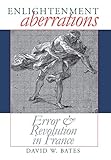Enlightenment Aberrations : Error and Revolution in France / David W. Bates.
Material type: TextPublisher: Ithaca, NY : Cornell University Press, [2018]Copyright date: ©2002Description: 1 online resource (280 p.)Content type:
TextPublisher: Ithaca, NY : Cornell University Press, [2018]Copyright date: ©2002Description: 1 online resource (280 p.)Content type: - 9780801439452
- 9781501726811
- 944.04
- online - DeGruyter
- Issued also in print.
| Item type | Current library | Call number | URL | Status | Notes | Barcode | |
|---|---|---|---|---|---|---|---|
 eBook
eBook
|
Biblioteca "Angelicum" Pont. Univ. S.Tommaso d'Aquino Nuvola online | online - DeGruyter (Browse shelf(Opens below)) | Online access | Not for loan (Accesso limitato) | Accesso per gli utenti autorizzati / Access for authorized users | (dgr)9781501726811 |
Frontmatter -- Contents -- Preface -- 1. Aberrations of Enlightenment -- 2. Wandering in the Space of Knowledge -- 3. Improper Couplings: Language, Judgment, and Epistemological Desire -- 4. Cutting through Doubt: Condorcet and the Political Decision -- 5. "The General Will Cannot Err": Representation and Truth in Early Revolutionary Political Thought -- 6. The Terror: Marking Aberration in the Body Politic -- 7. A Counter-Revolutionary Politics of Sin -- 8. Deviant Repetitions: Birth and Rebirth in Biology and History -- Epilogue: Modern Error -- Index
restricted access online access with authorization star
http://purl.org/coar/access_right/c_16ec
In Enlightenment Aberrations, David W. Bates shows that error was a complex, important, and by no means entirely negative concept in Enlightenment thought, one that had a decisive influence in revolutionary debates on political identity and national history. What can it mean to write a history of error? In Bates's view all philosophy, insofar as its project is the search for truth, begins in error. If truth is posited as a goal to be attained, not as a given of some kind, then error assumes a central role in the quest for truth. Going beyond both liberal celebrations and postmodern critiques of Enlightenment reason, Bates reveals just how crucial the problematic relation between human "wandering" and the mystery of truth was in eighteenth-century thought. The author draws on a wide range of Enlightenment thinkers, including Etienne Bonnot de Condillac, Jean d'Alembert, Marie-Jean-Antoine-Nicolas Caritat, Marquis de Condorcet, Jean-Jacques Rousseau, and Charles Bonnet, showing how they wrestled with the "risk and promise" of error. He then demonstrates how the concept of error and its dialectical relationship to truth played out in the political culture of the French Revolution, particularly in the Terror. In the final chapters, Bates looks at the post-revolutionary transformations of the Enlightenment discourse of error and its subsequent history in modern European thought.
Issued also in print.
Mode of access: Internet via World Wide Web.
In English.
Description based on online resource; title from PDF title page (publisher's Web site, viewed 02. Mrz 2022)


